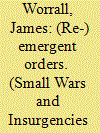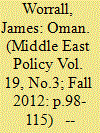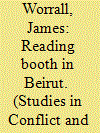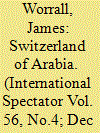|
|
|
Sort Order |
|
|
|
Items / Page
|
|
|
|
|
|
|
| Srl | Item |
| 1 |
ID:
153611


|
|
|
|
|
| Summary/Abstract |
The concept of order is often neglected in the study of conflict – seemingly such a ‘disordering’ process. With the recent increase in the examination of rebel governance however, bringing order back into our understanding of rebel and insurgent groups has much to offer in exploring the everyday politics which connect authorities, rebel movements and the population itself, in a complex mass of intersubjective and power-based interactions and negotiations. Rebels both shape and are shaped by existing forms of order in complex and ongoing ways. This article explores how varying elements interact in the negotiation, framing and enforcement of order and develops an original analytical framework to examine the perpetual negotiations of rebel movements in their attempts to cement their control.
|
|
|
|
|
|
|
|
|
|
|
|
|
|
|
|
| 2 |
ID:
186069


|
|
|
|
|
| Summary/Abstract |
While the administrations of Hafez and Bashar al-Assad employed torture regularly as a tool of authoritarian governance, this usage changed dramatically in nature as the revolution moved from protests to insurgency, which posed an increasingly significant threat to the regime’s survival. In the counterinsurgency literature, torture’s function is generally tied to intelligence gathering. In the context of Syria’s post-2011 Counterinsurgency (COIN) campaign, torture functioned more as a way to intimidate the population, forcing them to explicitly choose a side—especially in contested zones. The threat posed by the uprising amplified the scale, form, targeting, and purpose of torture, expanding it significantly. This article traces these dynamics, not only to explain the changing logics and practices of torture in Syria, but also to identify key actors, structures, and sites of analysis. It attempts to avoid falling into the normative trap of simply condemning torture, by moving its examination into a more analytical space, thereby demonstrating how torture can perform a critical function beyond intelligence gathering within an authoritarian COIN campaign.
|
|
|
|
|
|
|
|
|
|
|
|
|
|
|
|
| 3 |
ID:
184456


|
|
|
|
|
| Summary/Abstract |
In 2023, Civil Wars will achieve the milestone of its 25th anniversary. Since it was first formed by Caroline Kennedy-Pipe, Clive Jones and others at the University of Leeds back in 1998, the journal has published a broad and diverse range of articles related to the pressing global challenge of intrastate conflict, its causes, dynamics, effects and the responses it has engendered. Over its history, the journal has built a reputation as a specialist outlet for high-quality, interdisciplinary research, in particular on the causes, nature, triggers, dynamics, intensity, termination and the recurrence of civil war, covering a wide range of conflicts across the globe in its pages. We would like to take the opportunity presented by the publication of Vol. 24, No. 1 (2022) to introduce ourselves and outline our editorial vision for the coming years, if that is perhaps not too grand a term.
|
|
|
|
|
|
|
|
|
|
|
|
|
|
|
|
| 4 |
ID:
121501


|
|
|
| 5 |
ID:
120438


|
|
|
|
|
| Publication |
2013.
|
| Summary/Abstract |
The concept of Emancipation has become increasingly important in security studies in recent years but how well does the idea travel outside of the Western context in which it was conceived and into the Middle East? This article examines Hizbollah's four main identities: religious, resistance, socioeconomic, and as allies/proxies of Iran and asks to what extent this key regional non-state actor sees itself as an emancipatory agent in its own terms and how this differs from the Emancipatory ideal of Critical Security Studies (CSS). Does Hizbollah's current makeup offer enough scope to pursue Emancipation in line with the CSS project? Since the precept of Jihad offers Muslims a theological justification to engage in a holy struggle for a moral, spiritual, or political goal, seemingly Hizbollah is uniquely positioned to offer the prospect of Emancipation for the traditionally downtrodden Shi'a citizens of Lebanon, but does their Islamic faith and their aim of adherence to the Islamic way of life which they interpret from the Qur'an and Sunnah proscribe their credentials as truly Emancipatory actors? The article uses this analysis to examine the extent to which the commitment to universal Emancipation, found in CSS, is reconcilable with its Western-orientated foundation when applied in a Middle Eastern context.
|
|
|
|
|
|
|
|
|
|
|
|
|
|
|
|
| 6 |
ID:
183252


|
|
|
|
|
| Summary/Abstract |
In recent years, Oman has been recognised as a key mediator in the Gulf and the wider Middle East. The successful completion of the 2015 Iran nuclear deal, in particular, firmly cemented its reputation as a peacemaker. To fully understand Omani mediation practices in the region, Muscat’s mediation must be placed within the context of the Sultanate’s wider foreign policy, and all known mediations must be assembled in one place in order to develop a typology to better understand forms and patterns. Ultimately, mediation both serves and is enabled by the Sultanate’s foreign policy. This was not an inevitable outcome. Over the course of Qaboos’ reign, Oman has developed into an ‘Interlocutor State’, in which the practice of mediation has become an important tool in furthering the central goals of preserving Oman’s independent foreign policy, and thus ultimately the Sultanate’s sovereignty and security itself.
|
|
|
|
|
|
|
|
|
|
|
|
|
|
|
|
|
|
|
|
|